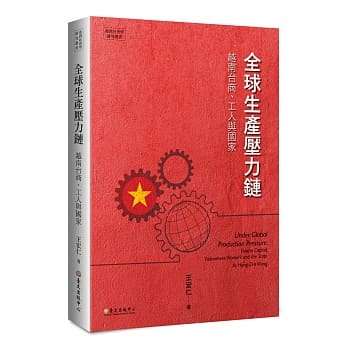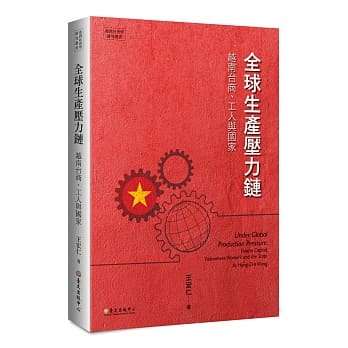Global Production Pressure Chain: Taiwanese Businessmen, Workers, and the State in Vietnam
Global Production Pressure Chain: Taiwanese Businessmen, Workers, and the State in Vietnam
In stock
Couldn't load pickup availability
ISBN/EAN: 9789863503668
出版日期: 2019-11-13
页数: 324页
语言: Traditional Chinese
Vietnam is not a mini-China. Taiwanese businesses investing in Vietnam are surprised to discover that their traditional Chinese management practices are completely ineffective. This book argues that Vietnam is a "defensive authoritarian regime," unlike China's "aggressive authoritarian system," and that Taiwanese businesses must adopt a flexible approach to labor management.
Through the concept of "global production pressure chains," we can understand the specific position of Taiwanese businesses within the global capitalist production system, as well as the factory labor management practices implemented to address Vietnamese labor policies, ethnicity, and gender differences. The concept of "structural holes" allows us to see how contradictory structural forces allow workers of different ethnicities and genders to take various actions to resist capital's control.
This book uses the perspective of economic sociology to understand the organizational operations of Vietnamese society and Taiwanese businessmen. For readers who are interested in the political economy or social culture of Southeast Asia, or those who hope to work in Taiwanese companies, or students who want to understand how global capital operates, the book's detailed first-hand information can provide relevant inspiration.
Wang Hongren
PhD in Sociology from the Australian National University, Professor of Sociology at National Sun Yat-sen University. Beginning with a doctoral dissertation on Taiwanese small and medium-sized enterprises, he has gradually moved into research on Taiwanese overseas investment, Taiwanese businesses in Vietnam, Vietnamese migrant workers, transnational marriages between Taiwan and Vietnam, and most recently, gender and intimate relationships. He founded the blog "Xiangzikou Sociology." His works include: "Field Craft" (co-edited with Guo Peiyi), "Xiangzikou Sociology" (co-authored by several others), "Politics of Difference in Taiwan" (co-edited with Tak-Wing Ngo), and "Postwar Taiwan Economic Analysis" (written by Liu Jinqing, translated with Lin Jiwen).
Table of Contents Table of Figures Preface
Chapter 1 Introduction: Taiwanese Factories in Vietnam Under the Global Pressure Chain of Production <br />1. Global Production Pressure Chain Shaped by the Global Self-Regulated Market 2. Taiwanese Factory System and Social Self-Protection 3. Structural Holes Provide Space for Workers’ Resistance (1) Multifaceted and Contradictory Social Relations (2) “Structural Holes” Pulled Out by Contradictory Structural Forces
(3) Types of Workers' Resistance 4. The Structure of This Book: State, Ethnicity, and Gender (1) The Role of the State and the Labor Movement (2) Racialized Production Politics (3) Gender, Capital Accumulation, and Reproduction 5. Primary Sources of Data for This Book
Chapter 2: Socialist Vietnam in the Global Capitalist System <br />1. Vietnam's Political and Economic Development after Reform and Opening Up 2. The Tripartite Labor Market: State-Owned, Private, and Foreign-Owned 3. Taiwanese Investment in Vietnam 4. Changes in the Chinese Economy and the Transnational Flow of Taiwanese Capital 5. Summary: The Vietnamese Economy Integrated into Global Capitalism
Chapter 3 Defensive Authoritarian State and the Vietnamese Workers’ Movement <br />1. Discussion on the nature of strikes in Vietnam (1) Comparison with Chinese labor strikes (2) Binary classification of strikes based on rights vs. interests 2. “State-society” relations in Vietnam (1) Analysis of different perspectives on “state-society” relations in Vietnam (2) The dynamic and contradictory relationship between the state and workers 3. Vietnam’s trade union system and its political position (1) The position of VGCL in national politics (2) Vietnam Chamber of Commerce and Industry in the tripartite consultation between labor, management and government 4. The relationship between strikes and the state 5. Sympathetic political strikes: the 513 workers’ riot in 2014 (1) The situation of the 513 workers’ riot (2) The 513 workers’ riot under ethnic tensions (3) The “workers-society-state” relationship in strike protests 6. The strike over pension disputes in 2015 (1) The causes, process and results of the strike (2) Why did workers strike?
3. The “Worker-Society-State” Relationship in Strike Protests VII. Summary: Political and Economic Changes in Vietnam During the Workers’ Movement
Chapter 4 The Vietnamese workers’ movement under the global production pressure chain <br />1. Strikes caused by wages, working hours and management (1) Wage issues (2) Excessive working hours (3) Management issues 2. The process and results of “institutionalized” strikes (1) Was there any organization and coordination before the strike?
(II) Negotiations at the Strike Site (III) Factors Influencing Negotiation Outcomes III. Labor Control Methods: Authoritarianism vs. Hegemony (I) Authoritarian Labor Management Methods (II) Hegemonic Control Methods IV. Vietnamese Workers Under Global Production Pressure Chains V. Democratizing Unions and Improving Working Conditions VI. The Impact of Global CSR on Local Labor Relations VII. Labor-Capital Issues in Pluralistic Power Relations
Chapter 5 Racialized Society and Transnational Capital Accumulation <br />1. Racialization, or ethnic relations?
II. Cultural Racialization Processes III. Suspected Minorities: The Changing Status of Chinese in Vietnam IV. Everyday Vietnamese-Chinese Relations: Language, Intermarriage, and Identity V. Chinese Capital Expansion and Anti-Chinese Sentiment in Vietnam (I) Ethnic Conflict Between Vietnamese and Chinese (II) Changing Divisions of Labor Between Taiwanese, Vietnamese, and Chinese in Factories VI. Summary: The Changing Ethnic Relations Between Vietnamese and Chinese
Chapter 6: Racialized Production Politics within Taiwanese Factories <br />1. Postcolonial Discourse and Racialized Production Politics 2. Taiwanese Cadres (1) Taiwanese Cadres and Vietnamese Workers (2) Taiwanese Cadres and Vietnamese Cadres (3) Taiwanese Cadres and Mainland Cadres 3. Chinese Cadres (1) Mainland Cadres and Taiwanese Cadres (2) Mainland Cadres and Vietnamese Employees 4. Chinese in Vietnam 5. Vietnamese Workers and Racialized Promotions 6. Summary: Vietnamese Cadres Will Gradually Replace Mainland Cadres
Chapter 7 Gender, Labor, and Family Reproduction <br />1. Women's Labor and the Development of Capitalism 2. Postcolonial Women's Discourse 3. Traditional Vietnamese Family System and Gender Culture (1) Family and Gender Relations under the Influence of Bi-lineal Social Culture (2) Gendered Family Socialization Process (3) From Socialism to Capitalism 4. Dormitories, Hukou, and Labor Reproduction 5. "Doing Family": Gendered Remittance Behavior 6. Childrearing, Family System, and Class 7. Summary: More Class-Oriented Family Reproduction
Chapter 8: Women’s Negotiation and Resistance to Transnational Capital <br />1. Female Workers in Taiwanese Factories (1) Basic Background Information of Workers (2) Discourse on Differences between Male and Female Workers and Masculine Management Models 2. Female Workers’ Resistance (1) Whispering (2) Guerrilla Tactics 3. Taiwanese Female Managers in Factories (1) Dormitories and Gendered Reproduction of Labor Force (2) Gendered and Racialized Marriage (3) Gendered Interaction and Marriage Space 4. The Frontiers of Empire: Heads and Women 5. Summary: Women’s Contributions to Capital Accumulation
Chapter 9 Conclusion: Actors in Structural Holes <br />1. The Vietnamese Government, Workers, and Capital under the Pressure of Global Production Chains 2. The Taiwanese Factory System Embedded in Social Structures 3. Workers' Resistance Exploiting Structural Holes 4. Dialogue with Related Research (1) Transnational Capital and Third World Studies (2) Labor and Ethnic Relations (3) Gender and Labor
Postscript: Academic Background and Research Reflection Bibliographic Index
Share


